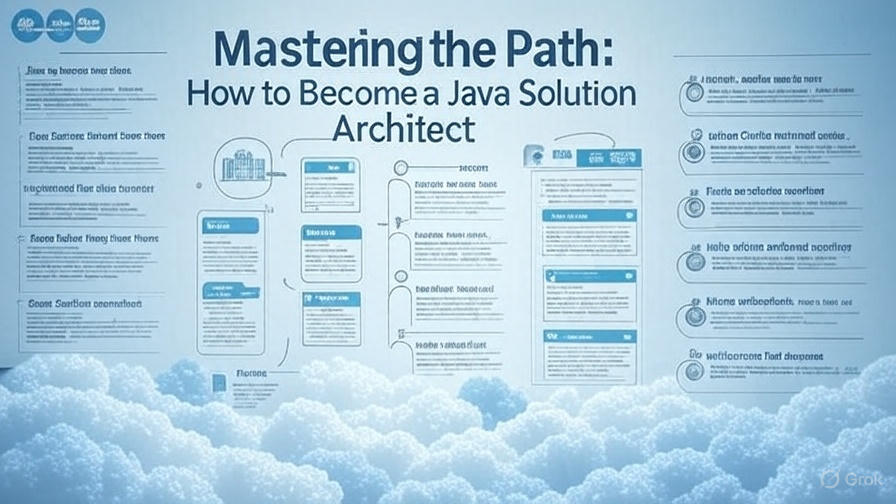How to Become a Java Solution Architect: Step-by-Step Guide
Embarking on the journey to become a Java Solution Architect is both challenging and rewarding. This role demands a deep understanding of Java ecosystems and the ability to design robust software solutions. Whether you’re starting with a free Java course with certificate or you’re an experienced developer, this guide will walk you through the essential steps to achieve your goal.
Understanding the Role of a Java Solution Architect
A Java Solution Architect is responsible for leading the design and implementation of Java-based applications. This role requires a blend of technical expertise and leadership skills to guide development teams effectively.
Key Responsibilities
- System Design: Crafting scalable and efficient software architectures.
- Technical Leadership: Guiding teams through complex technical challenges.
- Collaboration: Working with stakeholders to align technical solutions with business goals.
Step 1: Build a Strong Foundation in Java
To excel as a Java Solution Architect, you need a solid foundation in Java programming. Starting with a Java course online free with certificate can provide you with the necessary skills and credentials to advance your career.
Master Core Java Concepts
- Syntax and Constructs: Understand the basic building blocks of Java.
- Object-Oriented Principles: Master classes, objects, inheritance, and polymorphism.
- Data Structures and Algorithms: Gain proficiency in essential data structures and algorithms.
Explore Advanced Java Topics
- Java EE: Learn about enterprise-level Java development.
- Concurrency: Understand multithreading and concurrent programming.
- Performance Tuning: Optimize Java applications for better performance.
Step 2: Gain Practical Experience
Theoretical knowledge is crucial, but practical experience sets you apart. Engage in real-world projects to apply what you’ve learned.
Work on Diverse Projects
- Open Source Contributions: Participate in open-source projects to collaborate with other developers.
- Internships and Jobs: Seek opportunities to work in professional environments.
- Personal Projects: Build your own applications to experiment and learn.
Step 3: Learn Related Technologies and Tools
A Java Solution Architect must be proficient in various technologies and tools that complement Java development.
Essential Technologies
- Frameworks: Spring, Hibernate, and Jakarta EE.
- Build Tools: Maven and Gradle.
- Version Control: Git and GitHub.
Cloud and DevOps
- Cloud Platforms: AWS, Azure, and Google Cloud.
- CI/CD Pipelines: Jenkins, Docker, and Kubernetes.
Step 4: Develop Soft Skills
Technical skills alone are not enough. Soft skills are essential for effective leadership and collaboration.
Communication and Leadership
- Team Management: Learn to lead and motivate development teams.
- Stakeholder Communication: Effectively convey technical information to non-technical stakeholders.
- Problem-Solving: Develop strong analytical and problem-solving skills.
Step 5: Pursue Certifications
Certifications can validate your skills and enhance your credibility as a Java Solution Architect.
Recommended Certifications
- Oracle Certified Professional: Java SE 11 Developer
- AWS Certified Solutions Architect
- Pivotal Certified Spring Professional
Step 6: Stay Updated and Network
The tech industry is constantly evolving. Stay updated with the latest trends and technologies.
Continuous Learning
- Online Courses and Workshops: Enroll in advanced courses to keep your skills sharp.
- Tech Blogs and Forums: Follow industry leaders and participate in discussions.
Networking
- Professional Associations: Join organizations like the Java User Group (JUG).
- Conferences and Meetups: Attend events to connect with other professionals.
Step 7: Apply for Java Solution Architect Positions
With a strong foundation, practical experience, and relevant certifications, you’re ready to apply for Java Solution Architect roles.
Craft a Strong Resume
- Highlight Key Projects: Showcase your most significant achievements.
- Tailor Your Resume: Customize your resume for each job application.
Prepare for Interviews
- Technical Interviews: Brush up on your problem-solving and coding skills.
- Behavioral Interviews: Practice answering questions about your experience and leadership style.
Conclusion
Becoming a Java Solution Architect is a journey that requires dedication, continuous learning, and practical experience. By following this step-by-step guide, you can position yourself for success in this rewarding career. Remember, the key to becoming a Java Solution Architect lies in mastering both technical and soft skills, staying updated with industry trends, and gaining hands-on experience.
FAQs
What is the role of a Java Solution Architect?
A Java Solution Architect is responsible for designing and leading the implementation of Java-based applications, ensuring they meet business requirements and technical standards.
How long does it take to become a Java Solution Architect?
The time it takes varies depending on your background and experience. Typically, it can take several years of dedicated learning and practical experience.
What are the essential skills for a Java Solution Architect?
Essential skills include proficiency in Java, knowledge of related technologies and tools, strong problem-solving abilities, and effective communication and leadership skills.
Are certifications necessary to become a Java Solution Architect?
While not strictly necessary, certifications can enhance your credibility and demonstrate your commitment to professional development.
What are some recommended certifications for aspiring Java Solution Architects?
Recommended certifications include Oracle Certified Professional: Java SE 11 Developer, AWS Certified Solutions Architect, and Pivotal Certified Spring Professional.
How can I gain practical experience in Java development?
You can gain practical experience by contributing to open-source projects, participating in internships, and working on personal projects.
What are the key responsibilities of a Java Solution Architect?
Key responsibilities include system design, technical leadership, and collaboration with stakeholders to align technical solutions with business goals.
How important are soft skills for a Java Solution Architect?
Soft skills are crucial for effective leadership, team management, and stakeholder communication. They complement technical skills and are essential for career growth.
What are some advanced Java topics I should learn?
Advanced Java topics include Java EE, concurrency, performance tuning, and enterprise-level Java development.
How can I stay updated with the latest trends in Java development?
You can stay updated by enrolling in online courses, following tech blogs and forums, and attending conferences and meetups.




